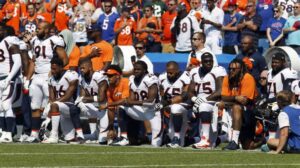Notice: Undefined offset: 1 in /var/www/wp-content/themes/jnews/class/ContentTag.php on line 86
Notice: Undefined offset: 1 in /var/www/wp-content/themes/jnews/class/ContentTag.php on line 86

By Jessica A. Johnson, For the African-American Athlete
President Donald Trump’s tweets and comments at an Alabama campaign rally for Republican Sen. Luther Strange were the equivalent of tinderboxes, as he called NFL players who are peacefully protesting during the national anthem “sons of bitches” and demanded that owners fire anyone who does not stand. It was fiery rhetoric that sparked solidarity across teams during Sunday games and Monday night football, and the hashtag #TakeAKnee is still heavily trending on Twitter.
As most casual sports fans know, the beginning of these protests started with former San Francisco 49ers quarterback Colin Kaepernick, who first sat and then knelt while the anthem was played last year to bring more attention to racial inequality, police brutality, and criminal-justice reform. Kaepernick was not signed by another team during the off season, and his staunchest supporters believe he was blackballed for standing up for his beliefs. Kaepernick might not ever play another down in the NFL, but he has had a substantial impact on the present social-justice conversation taking place in professional sports.
Since the NFL is roughly 70 percent African-American, Trump has been accused of specifically targeting black players and igniting yet another racial cultural war. He tweeted a rebuttal to this claim, stating that “the issue of kneeling has nothing to with race. It is about respect for our Country, Flag and National Anthem. NFL must respect this!”
With this tweet it is obvious that Trump has not actually listened to the players taking part in the protests, players like Philadelphia Eagles safety Malcolm Jenkins, who has emerged as a prominent voice, and others who are beginning to speak out more, including Seattle Seahawks cornerback Richard Sherman.
Black players are not disrespecting the flag or veterans and those in the military, as others have argued, and the fact that their white teammates locked arms with them confirms this. The players’ purpose is to bring more awareness to the injustices in our country that violate the democratic principles our flag represents.
It is difficult for many who disagree with black players who are kneeling or raising fists to understand where they are coming from, since the outward appearance of wealth and fame in the NFL makes it appear that their lives are insulated from average day-to-day concerns.
And from an historical context, we’re not fighting the overt segregation battles that players like the Cleveland Browns’ Hall of Fame fullback Jim Brown faced in the 1950s. I remember an interview that Brown did in the mid-1990s with HBO Sports where he discussed the hollow feeling of cheers from fans when he could not be served at certain restaurants.
“As an athlete people adored you in a superficial manner. As a man they didn’t pay very much attention to you,” Brown explained. “The irony is that when I played for 80,000 people in Cleveland Stadium they would cheer, and then I couldn’t go to a particular restaurant because I was a black man.”
I believe many of today’s black NFL players would assert that a lot of fans still do not understand their plight as men, specifically how they relate to current racial issues at the forefront such as police shootings.
When they read the headlines of stories like the fatal April shooting of Jordan Edwards, a 15-year-old black teen in a Dallas suburb, they know that could be one of their sons. And when they hear of incidents like former Georgia Cobb County Police Lt. Greg Abbott being caught on dashcam video telling a woman, “We only kill black people,” they know their status as pro athletes does not exempt them from racial profiling.
Another major point that Brown made in that HBO interview that applies to the players’ demonstrations is that if they only had to play football it would be easy. It would be easy for black athletes who are financially stable with great business and networking opportunities to ignore systemic racism. But they have chosen not to, and their stance is reverberating throughout the nation.
To contact Ms. Johnson: Smojc.jj@gmail.com @JjSmojc
